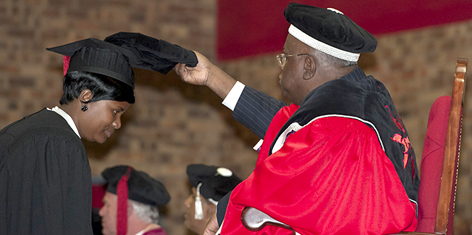Latest News Archive
Please select Category, Year, and then Month to display items
02 January 2025
|
Story Gerda-Marie van Rooyen
|
Photo Supplied
 Leading the research in South Africa is Prof Linus Franke from the Department of Soil, Crop and Climate Sciences.
Leading the research in South Africa is Prof Linus Franke from the Department of Soil, Crop and Climate Sciences.
Scientists are actively pursuing the successful breeding of diploid hybrid potatoes from inbred lines. This is expected to revolutionise potato breeding as it holds the key to rapid genetic progress. It will introduce new varieties for commercialisation through seed. Currently, existing potato variants have a gene that renders self-pollinated seeds infertile.
Prof Linus Franke, an academic in the Department of Soil, Crop and Climate Sciences at the UFS, is leading the research in South Africa. “This technology allows the production of genetically uniform potato seed that is easy to transport and largely disease-free.” He says this differs from conventional breeding whereby only vegetative propagation is possible due to tetraploid varieties in potatoes. It also risks carrying pests and diseases from one generation to the next – leading to the accumulation of pests and diseases with each round of multiplication.
Seed innovation
Prof Franke explains that Solynta BV, a seed company based in the Netherlands that produces potato varieties that can be grown from seed, has included South Africa in their research efforts because it is one of Africa’s largest producers and exporters. Through his academic relationship with Wageningen University and Research, a Dutch institution renowned for its agricultural endeavours and food production, the UFS became involved in researching hybrid potatoes grown from seed.
Diploid seeds containing two sets of chromosomes allow easier gene manipulation to increase predictability and speedier genetic progress. The breeding approach enables the incorporation of tolerance to pests, diseases, abiotic stresses (cold, heat, drought) and other desired genetic traits.
Although Prof Franke is optimistic about this research, he is not blind to disadvantages. “Potato seeds are tiny and have little energy reserves, making it harder to grow potatoes from seed than from tubers.” He says potatoes from seed will take longer to cultivate than tubers, as farmers need to grow plantlets from seeds first, adding six weeks to the growing period. “It is possible that commercial farmers can grow potatoes directly from seed. Alternatively, perhaps more likely, specialised growers will produce tubers of potatoes from seed; these tubers are then sold as seed tubers to other potato farmers, who then continue their normal practices of producing potatoes for the market from tubers.”
Financial benefits
Prof Franke says farmers have reason to get excited. “Seed potatoes will reduce input costs, as varieties with enhanced tolerance to pests and diseases require less pesticides. Planting one hectare of potatoes requires three to four tonnes of potato tubers, but only one 25 g packet of potato seeds.” Since potatoes are a more valuable commodity than maize, this technology might also increase farmers’ income potential.
Qwaqwa Campus honours academic excellence
2014-05-21
 Photo: Sonia Small (Kaleidoscope Studios)
Photo: Sonia Small (Kaleidoscope Studios)
Photo Gallery
Our Qwaqwa Campus was this past weekend a hive of activity when graduates, their parents and well-wishers descended on the campus to honour outstanding academic excellence during the Winter Graduation ceremonies.
On Friday graduates from the Faculty of Humanities, as well as the Faculty of Economic and Management Sciences, were addressed by Tommy Makhatho, Managing Director of the Qwaqwa-based Bibi Cash and Carry.
Makhatho urged graduates to continue working hard way beyond their graduation day and to dream big.
“Dream big and don’t let your poor background hold you back,” Makhatho said.
“Don’t let people say you can’t or that you will fail. Take up one idea. Make that one idea your life, think of it, dream of it, live on that idea, let your brain, muscle, nerves and every part of your body be full of that idea and leave every other idea alone. This is the way to success. If you don’t build your dream, someone else will hire you to help them build theirs,” said Makhatho, the winner of the 2013 Sanlam/Business Partners Entrepreneur of the Year and Job Creator of the Year awards.
On Saturday, graduates were treated to yet another moving message by eNCA’s news anchor, Mabale Moloi, herself a graduate in Biological sciences.
“If there is one ability that we should all practice on a daily basis, it is work ethics. This is a value based on hard work and diligence,” Moloi said.
Moloi further shared her views on what makes excellent work ethics.
“There are five very important factors of work ethics that we all need to be aware of. One of them is reliability. This means how committed you are to completing a task that is given to you within a particular period of time,” said Moloi.
“The second one is dedication. This means how prepared you are to go the extra mile in completing a job or your studies. Thirdly, one’s level of productivity is very important in having an excellent work ethic. This refers to giving the best of yourself, even to the extent of surpassing what is expected of you.”
“Fourthly, there is co-operation. We all must understand the value of team work and how it leads to success. And this, when paired with character, self-discipline and strong personality, will distinguish you from anyone else,” Moloi added.
Among the more than 800 degrees, diplomas and certificates conferred, were three PhDs in Physics, Polymer Science and Zoology, respectively. Four Masters of Science degrees were conferred cum laude.